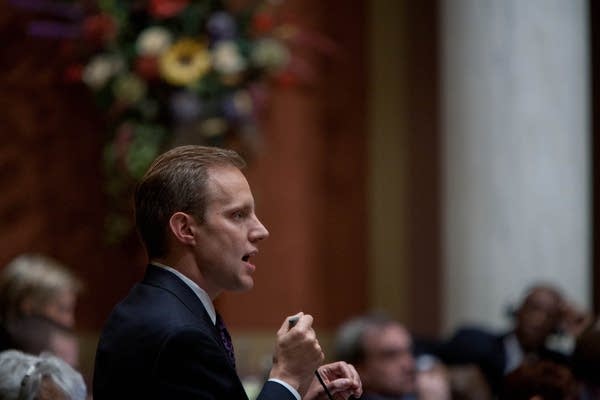Campaign finance board urges Legislature to approve tougher economic disclosure rules
Go Deeper.
Create an account or log in to save stories.
Like this?
Thanks for liking this story! We have added it to a list of your favorite stories.

Legislators are being asked to require public officials to say more about where they earn their money.
The Minnesota Campaign Finance Board voted Monday to encourage the Legislature to pass tougher economic disclosure laws. A proposal backed by the board would require officials to make public their consulting interests and details about income earned by their spouses.
The Minnesota Campaign Finance Board's action does not change how public officials disclose their outside income. But their recommendations will carry considerable weight with lawmakers who could make the changes. Board member Neil Peterson, a former Republican House member, said he hopes the board's recommendation will motivate legislators to update a law that hasn't changed since the 1970s.
"Part of our responsibility is to set the bar very high and that we should come with a bill that is inclusive and ask the Legislature to stretch in its thinking to get to the highest level of integrity that we can expect them to get to," Peterson said. "Because sometimes they simply cannot do it by their process."
Turn Up Your Support
MPR News helps you turn down the noise and build shared understanding. Turn up your support for this public resource and keep trusted journalism accessible to all.
The 4-2 vote for the measure came after several months of wrangling as to whether the board should take a position on the disclosure law. Minnesota requires elected officials, commissioners and other political appointees to file a statement that details their outside income.
But the law is littered with loopholes that allow officials to shield income if they are self-employed. An investigation by MPR News found that in many cases the disclosure forms filed by elected officials provided little if any meaningful information about the sources of their outside income.
The board's proposal would change that. Any sole-proprietor who receives $2,500 or more would have to disclose his or her clients. The overall goal of the change is to give the public a better understanding when public officials have a conflict of interest.
Board member Deanna Wiener, a former DFL state Senator, also voted for the plan.
"I think the public is waiting for it. I think the Legislature is waiting for it," Wiener said. "I think they're waiting for a framework to start with."
The board is also recommending that public officials be required to disclose the financial interests of their spouses and children under the age of 18. That measure worried Board Chair Andy Lugar. The Minneapolis attorney said he worries it could have unintended consequences.
"You don't want people deciding not to take on these people, to take on these kinds of positions, because it would then require disclosure of private matters of a spouse," Lugar said.
But board member George Beck, a retired administrative law judge, said spousal income does make a difference.
"The economic welfare of my wife is a matter of great concern to me. I think it would be appropriate to include spouses in the statute," Beck said "I don't know how you overlook that if you're making a public decision."
Campaign Finance Board officials will now submit their plan to the Legislature and will lobby for its passage. The committee chairs who deal with elections issues in the Legislature say it is likely the Legislature will pass tighter economic disclosure requirements this session.
"This is a significant effort on the part of the board to give guidance to the Legislature," said Rep. Steve Simon, DFL-St. Louis Park, who chairs the House Elections Committee. "It doesn't mean we're going to swallow it whole, but it does mean we're going to carefully consider the recommendations."
Simon, an attorney, said he believes the board should have required attorneys to disclose more as well. He said there are ways for them to say more about how they earn their money without violating their ethical codes of conduct.
A spokeswoman for Gov. Mark Dayton said the governor also supports the concept of requiring public officials and candidates to disclose more about their outside income.
Dear reader,
Political debates with family or friends can get heated. But what if there was a way to handle them better?
You can learn how to have civil political conversations with our new e-book!
Download our free e-book, Talking Sense: Have Hard Political Conversations, Better, and learn how to talk without the tension.




